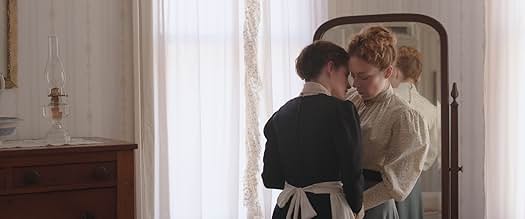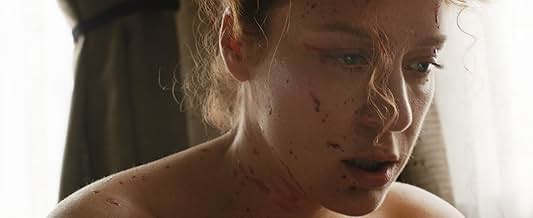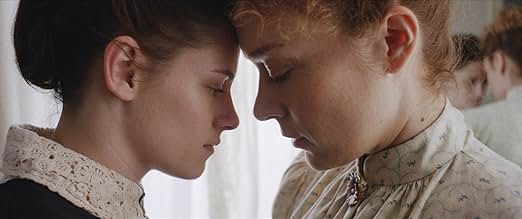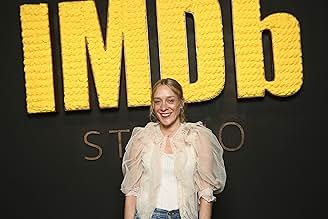IMDb-BEWERTUNG
5,9/10
9993
IHRE BEWERTUNG
Ein Psychothriller, der auf den berüchtigten Morden der Familie Borden von 1892 basiert.Ein Psychothriller, der auf den berüchtigten Morden der Familie Borden von 1892 basiert.Ein Psychothriller, der auf den berüchtigten Morden der Familie Borden von 1892 basiert.
- Auszeichnungen
- 1 Nominierung insgesamt
Empfohlene Bewertungen
I was more impressed than I expected to be with this film. It is slower paced in the first two acts, but Sevigny and Stewart both deliver performances worth watching, and the smaller details of the story are livened up enough that I was interested throughout. With some films surrounding killers, I feel as if the moment of murder is the only interesting aspects, but with this film, Lizzie's character was compelling enough to keep me engaged throughout. There were a few shakier scenes with some minor characters, and a few scenes that felt a touch overdone, but for the most part this was a very decent film.
Just four years after Lizzie Borden Took an Ax and the campy TV mini series it spawned, were audiences really clamoring for another Lizzie Borden film?
An uninspiring cast sleepwalks its way through this speculative take on an all-too-familiar story in Lizzie (2018), written by Bryce Kass and directed by Craig William Macneill. The film pits Lizzie Borden and the family's live-in maid, Bridget Sullivan, against her tyrannical father and unsympathetic step mother in what co-producer and lead actress Chloë Sevigny described as an overtly feminist take.
The film opens in the aftermath of Andrew (Jamey Sheridan) and Abby (Fiona Shaw) Borden's murder. An investigator asks their 32-year-old daughter, Lizzie (Chloë Sevigny), whether her father had any enemies. From there, the film rewinds to the family's employment of a 25-year-old Irish maid named Bridget Sullivan (Kristen Stewart). According to the filmmakers, that was the catalyst for the eventual double homicide, and the answer to the investigator's question. There is never a question about Lizzie Borden's involvement in her parent's death. The obvious foil, and rival for Lizzie's inheritance, her uncle John Morse (Denis O'Hare), serves as a flimsy red herring.
Lizzie's central conflict is between Lizzie, Bridget, and her domineering father, who seeks to control all the women living under his roof. While Lizzie's sister, Emma (Kim Dickens), fades into the background, Lizzie and Bridget find themselves in a compromising position, one that leads to her parents' gruesome murder. Sevigny herself characterized this as a literal "smash the patriarchy" moment.
In real life, Andrew and Sarah Borden were found murdered in their Fall River, Massachusetts home on August 4, 1892. Their middle aged daughters, Lizzie and Emma, lived with them, along with their maid, Bridget Sullivan. There had been significant tension in the family leading up to the murders, and Lizzie gave conflicting alibis. Lizzie was arrested and put on trial. After 90 minutes of deliberation, the all-male jury acquitted her. Her trial was a national media sensation, but to this day, there are many competing theories about "whodunnit."
Like most dramatizations of these events, Lizzie both assumes Lizzie Borden was guilty and that she committed the murders with an ax. In reality, the murder weapon was never determined, though the movie does try to explain why the hatchet in question lacked any evidence of being used in the crime. The film also omitted the food poisoning the family suffered, and the extended trip Lizzie and her sister took prior to the murders. Although the house interior looked accurate, the exterior bears little resemblance to its historic counterpart.
There's also no evidence Lizzie was a lesbian or that she was sexually involved with Bridget Sullivan, or that Mr. Borden sexually assaulted Bridget. That allegation came from mystery author Evan Hunter (aka Ed McBain)'s 1984 novel Lizzie, a work of fiction. Contemporary rumors about Lizzie's sexuality were of the kind gossipers leveled at any unmarried, middle-aged person at the time.
Like Lizzie, Lifetime's biopic Lizzie Borden Took an Ax (2014) also weirdly sexualizes her. Both films depict her as a seductress and show her committing the murders in the nude and drinking alcohol. Lizzie Borden was, in real life, an upper class spinster, Sunday school teacher, teetotaler, and member of the Women's Christian Temperance Union.
Their contemporary revision of Lizzie Borden's personality is where the two films part ways. For all its faults, Lizzie Borden Took an Ax at least accurately portrayed Lizzie and her sister Emma's close relationship, while in Lizzie, Emma vanishes for most of the film. Their actual family dynamic was sidelined to make room for a lesbian fantasy, which at this point is such a boring cliche in feminist film.
Lizzie grossed $642,157 at the box office, and currently holds a 65% rating from critics and 56% audience favorability on RottenTomatoes. The filmmakers were obviously hoping controversy and its two leading ladies would carry their film, but even a contractually-obligated effort on the part of Chloë Sevigny and Kristen Stewart couldn't save this dreary rehash of a 126-year-old unsolved murder.
An uninspiring cast sleepwalks its way through this speculative take on an all-too-familiar story in Lizzie (2018), written by Bryce Kass and directed by Craig William Macneill. The film pits Lizzie Borden and the family's live-in maid, Bridget Sullivan, against her tyrannical father and unsympathetic step mother in what co-producer and lead actress Chloë Sevigny described as an overtly feminist take.
The film opens in the aftermath of Andrew (Jamey Sheridan) and Abby (Fiona Shaw) Borden's murder. An investigator asks their 32-year-old daughter, Lizzie (Chloë Sevigny), whether her father had any enemies. From there, the film rewinds to the family's employment of a 25-year-old Irish maid named Bridget Sullivan (Kristen Stewart). According to the filmmakers, that was the catalyst for the eventual double homicide, and the answer to the investigator's question. There is never a question about Lizzie Borden's involvement in her parent's death. The obvious foil, and rival for Lizzie's inheritance, her uncle John Morse (Denis O'Hare), serves as a flimsy red herring.
Lizzie's central conflict is between Lizzie, Bridget, and her domineering father, who seeks to control all the women living under his roof. While Lizzie's sister, Emma (Kim Dickens), fades into the background, Lizzie and Bridget find themselves in a compromising position, one that leads to her parents' gruesome murder. Sevigny herself characterized this as a literal "smash the patriarchy" moment.
In real life, Andrew and Sarah Borden were found murdered in their Fall River, Massachusetts home on August 4, 1892. Their middle aged daughters, Lizzie and Emma, lived with them, along with their maid, Bridget Sullivan. There had been significant tension in the family leading up to the murders, and Lizzie gave conflicting alibis. Lizzie was arrested and put on trial. After 90 minutes of deliberation, the all-male jury acquitted her. Her trial was a national media sensation, but to this day, there are many competing theories about "whodunnit."
Like most dramatizations of these events, Lizzie both assumes Lizzie Borden was guilty and that she committed the murders with an ax. In reality, the murder weapon was never determined, though the movie does try to explain why the hatchet in question lacked any evidence of being used in the crime. The film also omitted the food poisoning the family suffered, and the extended trip Lizzie and her sister took prior to the murders. Although the house interior looked accurate, the exterior bears little resemblance to its historic counterpart.
There's also no evidence Lizzie was a lesbian or that she was sexually involved with Bridget Sullivan, or that Mr. Borden sexually assaulted Bridget. That allegation came from mystery author Evan Hunter (aka Ed McBain)'s 1984 novel Lizzie, a work of fiction. Contemporary rumors about Lizzie's sexuality were of the kind gossipers leveled at any unmarried, middle-aged person at the time.
Like Lizzie, Lifetime's biopic Lizzie Borden Took an Ax (2014) also weirdly sexualizes her. Both films depict her as a seductress and show her committing the murders in the nude and drinking alcohol. Lizzie Borden was, in real life, an upper class spinster, Sunday school teacher, teetotaler, and member of the Women's Christian Temperance Union.
Their contemporary revision of Lizzie Borden's personality is where the two films part ways. For all its faults, Lizzie Borden Took an Ax at least accurately portrayed Lizzie and her sister Emma's close relationship, while in Lizzie, Emma vanishes for most of the film. Their actual family dynamic was sidelined to make room for a lesbian fantasy, which at this point is such a boring cliche in feminist film.
Lizzie grossed $642,157 at the box office, and currently holds a 65% rating from critics and 56% audience favorability on RottenTomatoes. The filmmakers were obviously hoping controversy and its two leading ladies would carry their film, but even a contractually-obligated effort on the part of Chloë Sevigny and Kristen Stewart couldn't save this dreary rehash of a 126-year-old unsolved murder.
Loved the chemistry between Stewart and Sevigny and it is beautifully shot. The Borden house is almost a character in and of itself. With so many films that move so fast, it was refreshing to watch the tension build in the household slowly.
This film added so much more to the infamous story that I already knew. It brought it to life. While Sevigny may not be happy with the final product, as a fan of hers and Stewart's I was impressed. Also, great performance by Denis O'Hare as Lizzie's uncle.
This film added so much more to the infamous story that I already knew. It brought it to life. While Sevigny may not be happy with the final product, as a fan of hers and Stewart's I was impressed. Also, great performance by Denis O'Hare as Lizzie's uncle.
"Lizzie" chronicles one of America's most famous crimes-the hatchet murders of prominent Massachusetts businessman Andrew Borden and his wife, Abby. The suspect? His spinster daughter, Lizzie, whose name has gone down in infamy.
Originally a passion project for star Chloë Sevigny, around whom talk has circled for nearly a decade regarding a Lizzie Borden biopic/miniseries, "Lizzie" is a well-made psychological drama that will likely satisfy as many people as it will utterly alienate. The screenplay here, as with any kind of historical fiction, takes liberties and makes speculations, the most singular being that Lizzie committed the murders after her father uncovered a romantic relationship between her and the Bordens' house servant, an Irish immigrant named Bridget Sullivan. While this is obviously speculative, when one actually sits and considers the written accounts and evidence, it is not necessarily unlikely, and is a position that has been argued by several historians and journalists. Did it really happen this way? We will never know for sure.
That aside, this take on the material is above-average in many ways: It's well-shot and atmospheric, with just the right touches of the Victorian Gothic. It's also remarkably well-acted, with Sevigny surprisingly turning in a convincing performance as Borden (as a huge fan of her work, I was personally skeptical of whether the role would fit her right). Kristen Stewart is perhaps more shockingly good as Bridget, the servant caught in the eye of the storm. I do feel the film stumbles a bit in terms of its narrative structure, as it begins with a snippet of the crime's "discovery," then loops back to the build-up before cutting away again just before the killings. The gritty details then are presented in a flashback which, though effective, I think would have better served as a straightforward conclusion in a chronological account. The court scenes that rear themselves in the last act, though brief, feel dull and ultimately draw the viewer out of the core narrative; and, given that the audience ostensibly already knows how it ends, I feel the filmmakers would have benefitted from laying the story out in a no-nonsense fashion.
Despite these narrative pitfalls, I still found "Lizzie" a compelling take on a rather common (and frankly well-supported) theory regarding the Borden murders. Did it happen exactly this way? Probably not. But there is potential truth here. And even if there's not, the story itself remains compelling all the same. 7/10.
Originally a passion project for star Chloë Sevigny, around whom talk has circled for nearly a decade regarding a Lizzie Borden biopic/miniseries, "Lizzie" is a well-made psychological drama that will likely satisfy as many people as it will utterly alienate. The screenplay here, as with any kind of historical fiction, takes liberties and makes speculations, the most singular being that Lizzie committed the murders after her father uncovered a romantic relationship between her and the Bordens' house servant, an Irish immigrant named Bridget Sullivan. While this is obviously speculative, when one actually sits and considers the written accounts and evidence, it is not necessarily unlikely, and is a position that has been argued by several historians and journalists. Did it really happen this way? We will never know for sure.
That aside, this take on the material is above-average in many ways: It's well-shot and atmospheric, with just the right touches of the Victorian Gothic. It's also remarkably well-acted, with Sevigny surprisingly turning in a convincing performance as Borden (as a huge fan of her work, I was personally skeptical of whether the role would fit her right). Kristen Stewart is perhaps more shockingly good as Bridget, the servant caught in the eye of the storm. I do feel the film stumbles a bit in terms of its narrative structure, as it begins with a snippet of the crime's "discovery," then loops back to the build-up before cutting away again just before the killings. The gritty details then are presented in a flashback which, though effective, I think would have better served as a straightforward conclusion in a chronological account. The court scenes that rear themselves in the last act, though brief, feel dull and ultimately draw the viewer out of the core narrative; and, given that the audience ostensibly already knows how it ends, I feel the filmmakers would have benefitted from laying the story out in a no-nonsense fashion.
Despite these narrative pitfalls, I still found "Lizzie" a compelling take on a rather common (and frankly well-supported) theory regarding the Borden murders. Did it happen exactly this way? Probably not. But there is potential truth here. And even if there's not, the story itself remains compelling all the same. 7/10.
The acting of Chloe Sevigny, Kristen Stewart, and Jamey Sheridan carries this film, as I see it. It's the latest interpretation of what happened on August 4th, 1892, in Fall River, Massachusetts, when the sensational axe murders of Andrew and Gabby Borden occurred in their home.
The movie is quite slow paced, and has several lurid, gruesome, and violent scenes perpetrated against both humans and animals. There's also a concurrent theme of sexual molestation, as well as graphic nudity in the final 25 minutes or so of the film.
Overall, this film won't appeal to everyone and can be difficult to watch at times, but, for me, the fine acting was enough to keep me engaged.
The movie is quite slow paced, and has several lurid, gruesome, and violent scenes perpetrated against both humans and animals. There's also a concurrent theme of sexual molestation, as well as graphic nudity in the final 25 minutes or so of the film.
Overall, this film won't appeal to everyone and can be difficult to watch at times, but, for me, the fine acting was enough to keep me engaged.
WUSSTEST DU SCHON:
- WissenswertesThe photograph in the locket that the fictional Lizzie's father gives her is of the real Lizzie Borden's mother Sarah. She died when Lizzie was a baby.
- PatzerThe end of the film states that Emma and Lizzie had a rift "soon after" the trial and became estranged, but it was actually 12 years later that Emma separated from Lizzie and moved out of their house forever. No one knows for sure what the rift was about, but it's believed by many that Emma discovered Lizzie really was guilty of the murders.
- Zitate
Bridget Sullivan: What was I to you? I don't know who you are.
Lizzie Borden: Were you better off before? Is that it?
- SoundtracksEbben? Ne Andrò Lontana From 'La Wally', Act I
Written by Alfredo Catalani
Performed by Maria Luigia Borsi and the London Symphony Orchestra, conducted by Yves Abel
Courtesy of Naxos
By arrangement with Source/Q
Top-Auswahl
Melde dich zum Bewerten an und greife auf die Watchlist für personalisierte Empfehlungen zu.
- How long is Lizzie?Powered by Alexa
Details
- Erscheinungsdatum
- Herkunftsländer
- Offizielle Standorte
- Sprache
- Auch bekannt als
- El asesinato de la familia Borden
- Drehorte
- Produktionsfirmen
- Weitere beteiligte Unternehmen bei IMDbPro anzeigen
Box Office
- Bruttoertrag in den USA und Kanada
- 642.157 $
- Eröffnungswochenende in den USA und in Kanada
- 47.580 $
- 16. Sept. 2018
- Weltweiter Bruttoertrag
- 844.786 $
- Laufzeit1 Stunde 45 Minuten
- Farbe
- Seitenverhältnis
- 2.39 : 1
Zu dieser Seite beitragen
Bearbeitung vorschlagen oder fehlenden Inhalt hinzufügen

Oberste Lücke
What was the official certification given to Lizzie Borden - Mord aus Verzweiflung (2018) in Spain?
Antwort





































